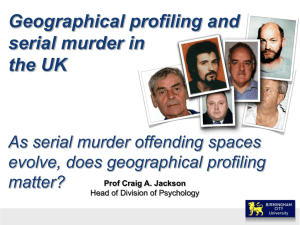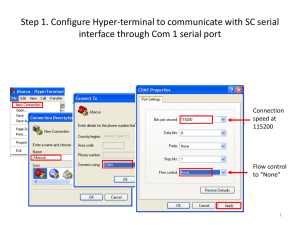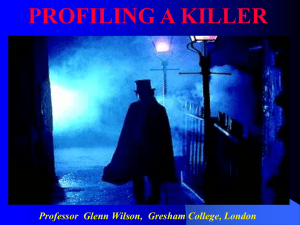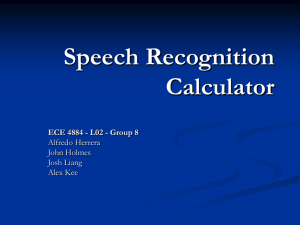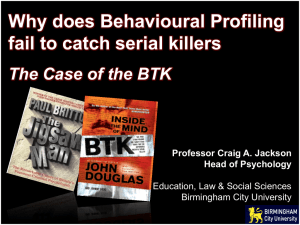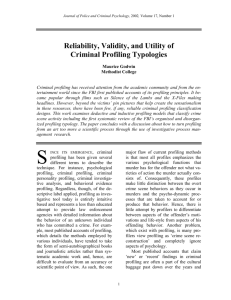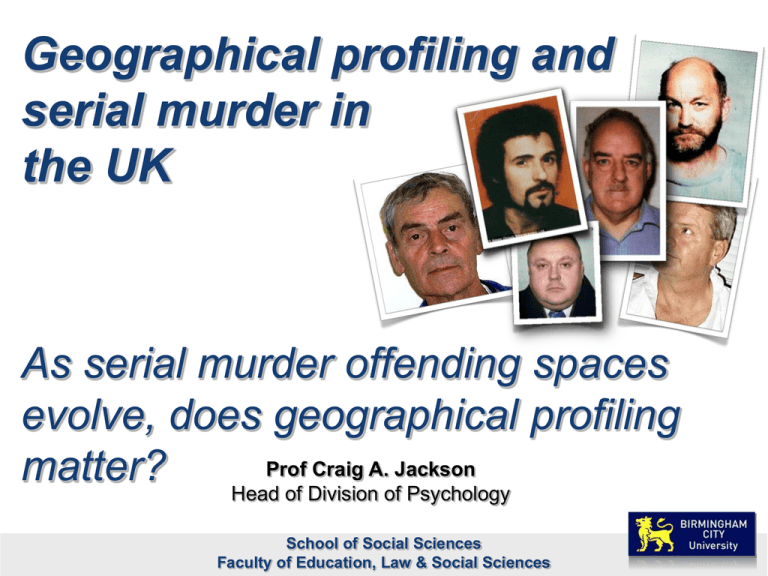
Geographical profiling and
serial murder in
the UK
As serial murder offending spaces
evolve, does geographical profiling
Prof Craig A. Jackson
matter?
Head of Division of Psychology
School of Social Sciences
Faculty of Education, Law & Social Sciences
Convicted UK Serial Murderers
Drivers /
Travellers
Authority
/Respectability
Health
Care
Unemployed /
Petty crime
Archibald Hall
John Haigh
Beverley Allit
Steve Grieveson
Harold Shipman
Peter Manuel
Peter Sutcliffe Michael Copeland
John Duffy
George Chapman
Colin Norris
Kenneth Erskine
David Mulcahy
Reg Christie
Neil Cream
Patrick Mackay
Fred West
Steven Griffiths
John Bodkin-Adams
Colin Ireland
Peter Moore
Ian Brady
Trevor Hardy
Robert Black
Myra Hindley
George Smith
Levi Bellfield
Dennis Nilsen
Mark Martin
Peter Tobin
Rose West
Steve Wright
Michael Kitto
Current serial murder hunt: UK
Stepping Hill Hospital
3 inpatients murdered over 3 weeks
44yr female
84yr male
71yr male
Insulin overdose via saline tampering
Arrest of 27yr Female nurse
Rebecca Leighton
Remanded for 1 month
Released - no grounds for prosecution
Offender space
Victims
Un-sub
Suspect
4000 staff
700 possible unsubs
Serial offender investigations
Overview
Consider failings of offender profiling
Assess development of Geo profiling
Consider importance of work & working apropos crimes
Don't understand the offenders - understand the environment
The role and context of driving, remoteness & isolation
Personality trait influences upon career selection
Placing serial murderers in broader categories neglected
Occupational typographies of UK serial murderers
I was worried about John...
Night-terrors
Emotional breakdown
Paranoia
Cardiovascular problems
Wellbeing of Law Enforcement
Health effects of high profile murder investigations
Soham murders:
SIO Chris Stevenson
James Bulger murder:
SIO Albert Kirkby
Ipswich ripper murders:
SIO Roy Lambert
Team of 47 detectives
Sought proactive "Stress Counselling”
Cromwell Street murders: Some accepted – others did not
SIO John Bennett
Upon retirement, He did one more investigation...
Side-tracked
Think about "work"
Label
Larry D Hall
Civil War Re-enactment
Identity
Judge others & selves
Five days per week
Fifty years of life
Voluntarily trapped
Cary Stayner
Forestry worker
Westonaria serial murderer
"Taxi driver"
Muldersdrift rapist
Offering work
Train worker
Impact of working
Work leaves imprint on most people
Physical, Psychological, Behavioural, Linguistic
Imprints van be specific to specific:
Occupation
Processes
Companies
Chemicals
Industrial "acute" injury - scars, removals, mutilations
Chronic disease / effects - mesothelioma, COPD, hearing loss
Dennis Rader aka BTK
Service in USAF
ADT home security installer
(1980s)
Graduate Kansas State University
(Computer science)
Scout Leader
(1980s 1990s)
Church Minister
City compliance officer
(1990s)
Work assisting investigations
Latitude & independence
Manifests
Skills / Training e.g. knots,
ligatures, chemicals, processes
butchery, stalking, record-snooping
Tools - imprints, technique, misuse, tapes, chemicals
Work assisting investigations
Jokes with colleagues / Boasts
Stories / Narratives / Slips
Sickness absence data
Pre-employment interview /
medical assessment
Colleague hunches and suspicions
Offending space within work duties
Existing routine data
Shift routines
Occ diseases - lung, spine, extremities
Modifications - vehicles, posture
Near misses
Warnings / disciplinary procedures
Complaints / investigations
Annual leave / compassionate leave
Sickness absence
Days, spells, duration, clusters, shot v long, weekends
John Snow - Broad Street Pump
Pioneer of Geographic Profiling
Prof. Stuart Kind
UK govt scientist & academic
Home Office Central Research Establishment
Accidentally invented geo profiling
Realised maps of serial crimes could predict base
Before term "offender profiling" even used
Led to "Lawrence Byford" report
(Geographic) Profiling Systems
HOLMES
CATCHEM
VICAP
VICLAS
DRAGNET
Reductionist
Data-Driven
Hypothetico-Deductive
Pioneer of Geographic Profiling
"In a few hours, using techniques he learned as a
Royal Air Force wartime navigator, he mapped the
dates and times of the killings, trying to determine
the centre of gravity of the attacks. He realised the
killer needed darkness and was trying to mislead
the police as to his operational base. But Kind
knew the Ripper had to return to his home as
soon as possible to avoid capture near the crime
scene. He deduced that the earlier in the evening
an attack happened, the further away from "home"
the killer was. Very late attacks happened close to
his base, so he could return home quickly."
Geo Profile #1
Yorkshire ripper attacks
5th Jul 1975 - 17th Nov 1980
20 attacks
13 deaths
Killer returns to same base
Early eve attacks far from
base
HQ is Manningham or
Shipley
Geo Profile #1
Assumptions
Had a singe base
Had access to a vehicle
Knew areas well
Had legitimate reason to be
"mobile"
Offending space
Offending Space
Structural approach
Context and background of
offender
Not ignoring victimology
Leyton's homicidal protest
1000,000 remote / isolated
workers in UK
(Crawford & Jackson)
HQ visit median 11 days
Offending spaces
Bulger murder & Soham murderers
Changed parenting style
Child victim access harder
Stranger-murder; victims changed to:
Sex workers
Elderly
Runaways
Gay men
Migrants
Workplace: one of new hunting grounds
Legitimate access / authority / alibi
Thinking
Feeling
Fantasising
Doing
Wilson & Jones 2007
Offending spaces are changing
New ways of working
New jobs / technology / services
Remote / Isolated working 1000,000 in UK
More people working more hours
More flexibility required
CCTV
ANPR
Geo Profile #2
Washington Snipers 2002
Assumed single sniper
Assumed anchor point
somewhere
Anchor Points
The base, home or HQ of
offender
Profiling harder if above defied
"Safe space"
"Psychological base"
En route
Jobs, second homes,
Multiple vehicles
Anchor Points
Railway rapists
1982-1985
Geo Profile #3
Robert Black 1982-1986
Younger abductees travel
further before struggling
Midland Triangle
PDS
Moving Target
Geo Profile #4
Simon Wadland 1988-1992
Bizarre phone calls
9am -5pm
Mons & Tues
The role of work
Holland's RIASEC model
Individuals actively "search" for jobs to match interests
Pairing of Individual and Job
When pairing succeeds, individuals are satisfied
When pairing does not match, individual will look around
Describes Personalities & Environments
Personality type gives clue to their ideal work environment
Holland 1997
Holland 1997
RIASEC Model
Relates to both PERSONALITY and ENVIRONMENT
"Realistic"
Doer
"Conventional"
Organiser
"Enterprising"
Persuader
"Investigative"
Thinker
"Artistic”
Creator
"Social"
Helper
"Realistics"
Practical individuals
Conformist
Ordered
Prefer objects and tools
Not keen on concepts or abstracts
Heuristics-driven
Mechanic, Labourer, Driver
"Investigatives"
Observational
Analytical
Independent
Intellectual
Problem-solving
Scientific, Technical, Engineering, Research
"Artistics"
Similar to "Investigative"
Prefers objectives
Enjoys manipulation & freedom of media
Prefers feasts rules / structural hierarchy
Painting, Decorator, Designer, Journalist, Writer
Holland 1997
RIASEC Model
Relates to both PERSONALITY and ENVIRONMENT
things
"Realistic"
Doer
"Conventional"
Organiser
"Investigative"
Thinker
ideas
"Artistic”
Creator
data
"Enterprising"
Persuader
"Social"
Helper
people
Prediger's dimensions
Trait influences on Job choice
Realist
Social
Artistic types
Recollections of childhood preferences,
vocation choice were predictive of job characteristics
Kasler & Novo 2005
Traits at childhood & adolescence predictive
40
Woodsof
& job
Hampson
2011
years later
Workplace deviance
Safe testing ground for deviant behaviours
Boundary testing
Rebelliousness
Grounded anchor to reality
Funds crimes
Alibis
Excitement of outwitting authority
Social structure and stability reassures
Proactive use of workplaces
Offence
Discovery Investigation
Offence Discovery
Arrest Evidence
Investigation Evidence Arrest
The age of transit
Structural approach
Context and background of
offender
Not ignoring victims
Leyton's homicidal protest
HQ visit median 11 days
Growth of car
Traveling serial murderer
1960s 1970s boom in car ownership
Expanding road network
Midlands home of car manufacture
Cheapest ownership in UK
Social protests at work and de-skilling of Midlands man
Prostitutes chased from urban streets by angry residents
Transport links
Midlands triangle
Intersection cities
Increase get away options / confusion
Decrease linkage likelihood
Midlands prostitute murders of 1980s 1990s
Multiple Police force boundaries
Vehicles - mobile anchor points
Essential hunting tool for sexually motivated
Psychological refuge place
Vital in folie a deux - teamwork not paired together
Crosses boundaries
Increases linkage blindness (Keppel & Birnes 2003)
Change vehicles increase further
Ford Capri; Corsair; Sunbeam Rapier; Rover 3.5
Access offending areas / sites
The age of transit
Jacques Lantier and "Lison" in La Bete Humaine,
Emile Zola (1890)
The age of transit
The age of transit
"Realistics" and their toys
Structural approach: vehicle use
Enables trolling / stalking
Fantasy space - anchor point
Covert trial runs
Extends Offending space
Valid reason for solitude / Alibi
Authority / Respectable
Drops likelihood of victim being related to offender
Summary
Working and Workplace rich source of data
Coupled with Geo Profiles IF conditions optimal
Evolution of serial murders creates conditions not suitable
for geo profiling
Placing serial murderers in broader categories neglected
Impact of Occupational choice upon serial murderers
Evolution of "offending space" models, incorporates more
time alone in role of work
References
Byford L, 1981, The Yorkshire Ripper Case, review of the police investigation. HMSO.
Canter D, 2003, Mapping Murder: the secrets of geographical profiling. Virgin, London.
Crawford J, MacCalman L, Jackson CA. 2011, In Depth Review: The Health and Wellbeing of Remote
and Mobile Workers. Occup Medicine, 61: 385-394
Jackson CA, Wilson D, Kaur-Rana B. 2011, The usefulness of criminal profiling. Criminal Justice
Matters, 84: 6-7.
Kind S, 1987, 'Navigational ideas and the Yorkshire Ripper investigation', Journal of Navigation, 40,
pp. 385-393.
Kind S, 1987, The Scientific Investigation of Crime, Forensic Sciences Services Ltd.
Snook B, 2003, Serial Crime andDistance: an analysis of serial offender spatial analysis. Unpublished
PhD thesis - University of Liverpool
Wilson D, Jackson CA, Kaur-Rana B. 2010' Against the Medical-Psychological Tradition of
Understanding Serial Killing by Studying the Killers. Amicus Journal, 22: 8-16.

